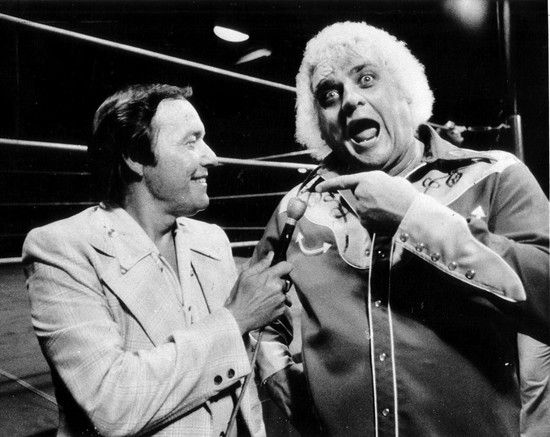In Professional Wrestling, it is pretty hard to stand out.
There are tens of thousands of guys with big muscles. There are lots of tall
guys. Guys weighing as much as a small car?
Yup. Even being insane will only get you so far, they have that covered
too. What decides, often, how popular you are or are not is what people see in
you, and how they see themselves.
If you think about some of the biggest names in Wrestling,
you often find a lot of idealism. Hulk Hogan, the 6'6", muscle-bound
bleached blonde guy. Ric Flair, the man who lives a life of luxury. We could
even throw in Bruno Sammartino; he had a simplicity about him, but he had the
body (and still does) chiseled out of stone. This is something wrestling has
always done well, it presents these figures that were, perhaps, out of reach
for most, and gives them values to make them either detestable or
inspirational. Pretty simple. The good guys, they do what they do out of
righteousness, and we cheer, but rarely could you feel a kinship.
Then, there was Dusty Rhodes. The Son of a Plumber. Perhaps,
most of all, the American Dream. Idealism took a holiday. Here came a man who,
in time, settled in with his protruding gut, his scraggily, short blonde hair,
and his prominent lisp. What did this man have to offer? Confidence. The
confidence of a working man. He did not have the genetics, he did not have the
heritage, he only had a belief in himself. I don't want to sell short his
ability to speak because he has cut some of the best promos in the history of
wrestling. The reason why he was so effective was because, somehow, the atoms
of the universe came together to create this human being primarily consisting
of shortcomings and mass, and granted him the confidence of an adonis.
He took a lot from the promos of Thunderbolt Patterson, but
he made it his own. The people looked at this guy, and he could easily be the
dad who lived next door, or the mechanic down at the shop. Instead, he was a
professional ass kicker. He was a cowboy. Dusty toed the line between stylish
and steeled. Fans could see themselves as him; an idol that isn't ideal. His
speech impediment became endearing, his promos would tout his flaws, but never
suggest he was anything less than the best.
Dusty was rarely, if ever, a heel. The people loved him too
much. He did battle, most notably, with the Four Horsemen and the Russians. And
when they would cross him, or put him down, the fans knew he'd be back. They
knew because Dusty knew. When the Horseman tied him up in a parking lot and
readied a bat to break his arm, he told them "Make it good!". He knew
that if they didn't put him down for good, he'd have his revenge. John Cena
'never gives up' in this more kid-friendly atmosphere of wrestling (which I
approve of whole-heartedly), but when Dusty took his beatings, his comeback was
about retribution not morals.
Dusty Rhodes represented a caste of people who were never
represented at that level before. The working man, the average human being with
some belief in themselves. It wasn't just a moniker. Dusty Rhodes looked like a
man who had over-achieved. That was the American Dream. To do better with life
than the place in it you were given. He was an outlet for the folks who got
home from work, kissed their kids on the forehead and sat down on the couch to
relax. He believed in them, and they believed in Dusty Rhodes. It's a sad day
for the working class.
